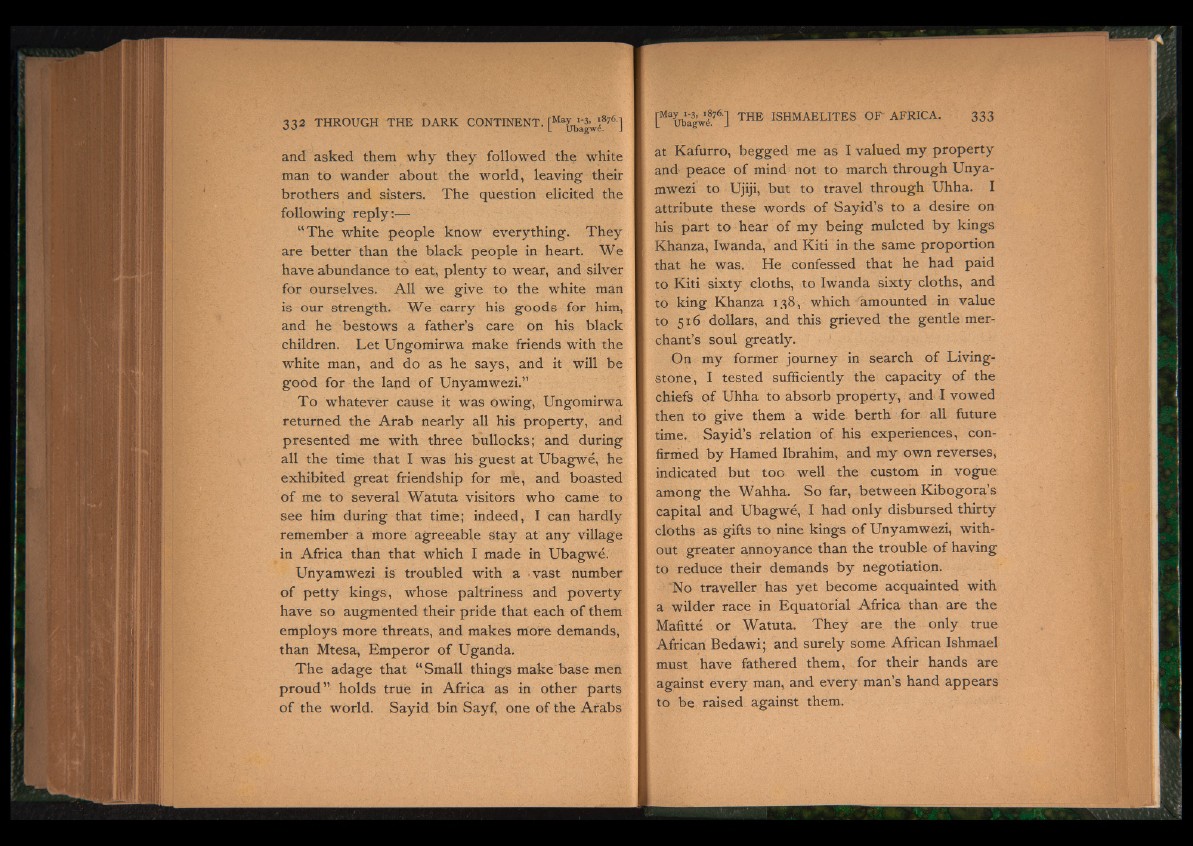
and asked them w h y they followed the white
man to wander about the world, leaving their
brothers and sisters. The question elicited the
following reply:—
“ T he white people know everything. T h e y
are better than the black people in heart. We
have abundance to eat, plenty to wear, and silver
for ourselves. A ll we give to the white man
is our strength. W e carry his goods for him,
and he bestows a father’s care on his black
children. L e t Ungomirwa make friends with the
white man, and do as he says, and it will be
go od for the land o f Unyamwezi.”
T o whatever cause it was owing, Ungomirwa
returned the A rab nearly all his property, and
presented me with three bullocks; and during
all the time that I was his guest at Ubagwe, he
exhibited great friendship for mb, and boasted
o f me to several Watuta visitors who came to
see him during that time; indeed, I can hardly
remember a more agreeable Stay at any village
in Africa than that which I made in Ubagwe.
Unyamwezi is troubled with a .vast number
o f p etty k in g s , whose paltriness and pove rty
have so augmented their pride that each o f them
employs more threats, and makes more demands,
than Mtesa, Emperor o f Uganda.
T h e adage that “ Small things make base men
p ro u d ” holds true in Africa as in other parts
o f the world. Sayid bin Sayf, one o f the Arabs
at Kafurro, begged me as I valued my property
and peace o f mind not to march through Unyamwezi
to Ujiji, but to travel through Uhha. I
attribute these words o f S a y id’s to a desire on
his part to hear o f my being mulcted b y kings
j Khanza, Iwanda, and Kiti in the same proportion
that he was. He confessed that he had paid
to Kiti s ix ty cloths, to Iwanda s ix ty cloths, and
to king Khanza 138, which amounted in value
to 516 dollars, and this grieved the gentle merchant’s
soul greatly.
On my former journey in search o f Livingstone,
I tested sufficiently the capacity o f the
chiefs o f Uhha to absorb property, and I vowed
then to give them a wide berth for all future
time. S a y id ’s relation o f his experiences, confirmed
b y Hamed Ibrahim, and my own reverses,
indicated but too well the custom in vogue
among the Wahha. So far, between Kib o go ra ’s
capital and Ubagwe, I had only disbursed thirty
cloths as gifts to nine kings o f Unyamwezi, without
greater annoyance than the trouble o f having
to reduce their demands b y negotiation.
‘No traveller has y e t become acquainted with
a wilder race in Equatorial Africa than are the
Mafitte or Watuta. T h e y are the only true
African Bedawi; and surely some African Ishmael
must have fathered them, for their hands are
against every man, and every man’s hand appears
to be raised against them.